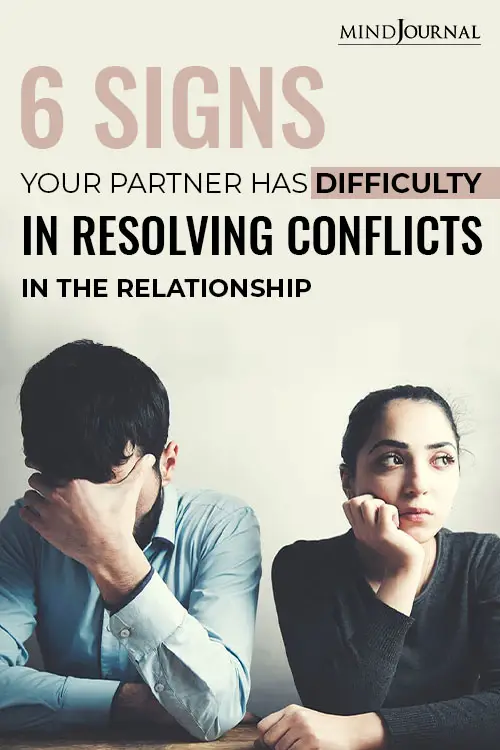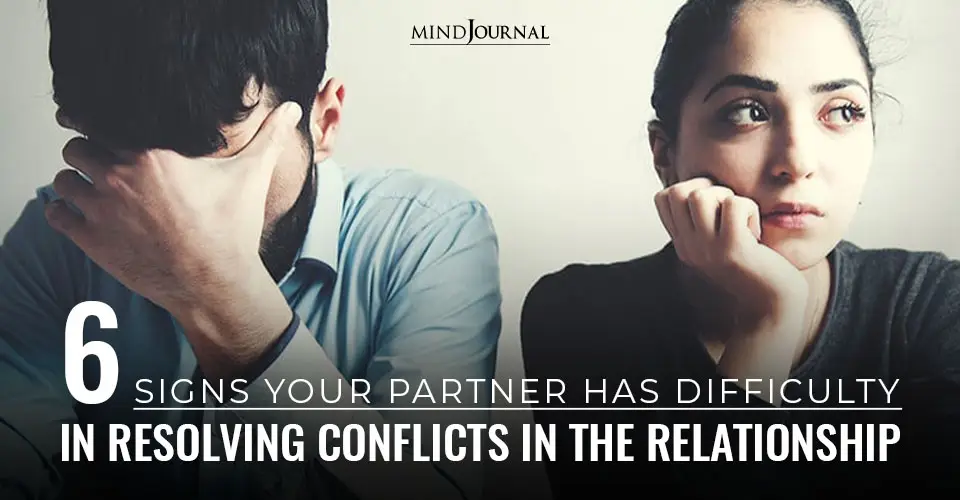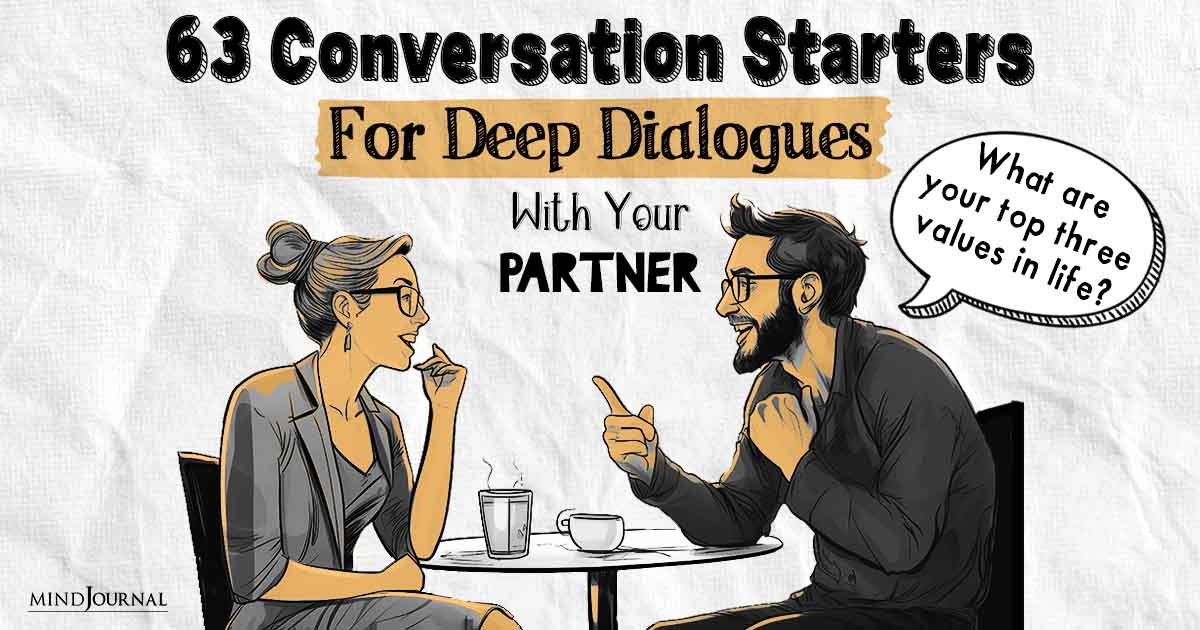Relationship conflicts can sometimes turn into such horrible nightmare fights, that you don’t even understand what really hit you. One moment both of you are talking about something minor, and the next moment the fight has escalated to the point of no return. You think, when and how did it go so wrong?
Minor ruptures or miscommunications are common in most relationships, yet when they are quickly resolved, trust and closeness are sustained. Alternatively, when small disagreements erupt into nightmare fights, it may be a sign that a partner is unable to resolve conflict productively.
These six signs indicate that a partner may be unable to hear or consider the material which makes him or her uncomfortable:
1. When you express a worry, feeling, or different perspective, does your partner react with anger or complete indifference?
2. Do minor disagreements escalate into epic battles that last for hours or even days?
3. Does attempting to explain a viewpoint in hopes of clarifying things seem to escalate the conflict because your words are twisted and used against you?
4. Does a partner get angry or shut down because he or she refuses to hear something about himself or herself that he or she doesn’t like?
5. Does a partner attack you instead of attempting to understand how and why you feel the way you do?
6. Do struggles seem to end with a winner and a loser instead of an amicably agreed-upon resolution? Has this resulted in you surrendering your perspective in order to avoid constant fighting?
When issues remain unresolved, and feelings are seldom understood, distance, distrust, and resentment may build. Soon, anger, depression, and anxiety are experienced by the person who has no choice but to stifle their feelings because a partner refuses to hear information that challenges his or her self-perception.
Although the situation seems dire, understanding the psychological underpinnings of the dysfunction is helpful. Ironically, a partner who is “walled-off” and acts “big” in the face of even a small and careful confrontation may actually feel very small and is probably trying to defend an extremely fragile ego.
Related: 9 Warning Signs Your Relationship Conflict Cannot Be Solved
A fragile ego often requires staunch defending and is likely to be at the root of the problem. Unconscious and extreme defense mechanisms, such as deflection, projection, victim stance, narcissism, and denial, may act in unison to keep out information that is too painful for the partner to tolerate. The fragility of the partner’s sense-of-self usually originates from three sources: an emotionally deficient attachment relationship with a primary caregiver, early childhood abuse, or exposure to parents who had volatile fights.
When contemplating these issues regarding a partner, it is helpful to consider his or her idealization of a problematic parent. Idealization is a defense mechanism unconsciously enacted to defend against viewing a parent negatively. Vastly exaggerating a parent’s positive qualities allows a child to defend against a conscious awareness of the emotional pain the parent inflicts. Extreme idealization may eventually prevent the person from seeing himself of herself realistically because he or she may have internalized the parent’s dysfunctional attributes.
For example, if a partner claims his parent was almost perfect, and without flaws, despite a differing reality, he may be defending against the parent’s problematic characteristics. Instead of seeing the troubling qualities realistically and consciously deciding to be different, he may have defended against this knowledge and instead internalized the destructive attributes. Unfortunately, pervasive idealization prevents a person from consciously differentiating from a parent and breaking the cycle of emotionally destructive habits.
Alternatively, a partner who sees a parent in a balanced manner, with both strengths and weaknesses, may have processed and adjusted to negative experiences with the parent. In turn, this may allow him or her to have a more realistic self-perception. A realistic view of a parent may indicate a partner is in touch with his or her uncomfortable emotions and, thus, less defensive. If this is the case, patience and support may be the best course.
The experience of childhood trauma may also explain why a partner has difficulty feeling secure enough to resolve conflict productively. Trauma often forces a young child to unconsciously resurrect a rigid and extreme defensive structure to ward off uncomfortable feelings that tax his or her sense-of-self.
Yet, as an adult, it is the feelings that cause discomfort, which must be tolerated and then contemplated in order to resolve conflict in a close relationship. Encouraging a partner to seek therapy to help him or her recover from childhood trauma and disarm extreme defense mechanisms may be necessary.
A final reason a partner is unable to resolve conflict maybe because he or she grew up observing his or her parents fighting in a volatile manner. A child often unconsciously enacts the defense mechanism “identification with the aggressor” in desperation. A child feels small, terrified, and helpless during trauma, so empathizing with the powerless person in the scenario is just too much.
The helplessness the child feels is barely tolerable, so he or she defends against it by identifying with the aggressor. This allows a child to feel powerful and in control in the face of terrifying chaos.
Related: 9 Common Negative Conflict Patterns That Damage Relationships
This childhood defense mechanism may contribute to an adult partner’s need to deflect and attack instead of listening with an open heart.
It is also very possible that all three of the experiences articulated above occurred in a partner’s life. This may make it nearly impossible for him or her to recover. In this situation, the most important thing to assess is the partner’s motivation. If a partner is highly motivated to evolve, accessing the correct help is critical. Eliciting a psychotherapist who is highly trained in a psychodynamic perspective may be the best route.
It is important to note that a dysfunctional relationship signified by a partner’s inability to resolve conflict may not be emotionally safe. If a person is rarely heard, constantly attacked, or rebuffed for having a feeling that is incongruent with a partner’s and is continually and unfairly accused, the person may need to find a way to exit the relationship and move on to someone who is emotionally healthy.
References:
https://www.aafp.org/afp/2002/1201/p2052.html
Written By Erin Leonard
Originally Appeared In Psychology Today
When you feel that a minor disagreement is turning into one of those horrible nightmare fights, then stop and take a deep breath. Try to get to the root of the problem and see what the issue actually is; if your partner has childhood issues which are causing them to react like this, then maybe the time has come for some serious therapy.









Leave a Reply
You must be logged in to post a comment.